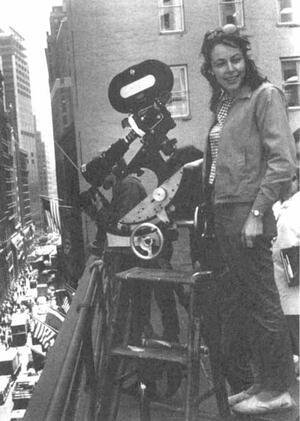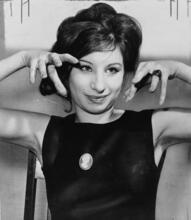Elaine May
The daughter of Yiddish theater star Jack Berlin, May made her stage debut at age three. She married Marvin May at sixteen and divorced him a year later, then hitchhiked to Chicago in the early 1950s, where she joined the Compass Players in 1955 and met Mike Nichols, a fellow troupe member. From 1960 to 1961 the pair performed brilliant improv as An Evening with Mike Nichols and Elaine May, with May playing roles ranging from the stereotypical Jewish mother to more traditionally masculine personae like a scientist or psychiatrist. She went on to write and direct the 1969 off–Broadway hit Adaptation, and direct movies such as 1972’s The Heartbreak Kid. She co–wrote the celebrated films Heaven Can Wait in 1978 and Tootsie in 1982. She brought an improv sensibility to her directing, encouraging actors to play with the material over multiple takes.
Elaine May, half of one of the most successful American comic teams of the 1950s and 1960s, became one of Hollywood’s first important female directors in the 1970s and 1980s. She has often combined her talents for acting and screenwriting with her role as director.
Early Life
Born in Philadelphia on April 21, 1932, as Elaine Berlin, May spent her early years moving from city to city because of her father’s career in show business. Jack Berlin was an actor in the Yiddish theater, and as a child, Elaine made several stage and radio appearances with him. He died when Elaine was eleven, and she moved to Los Angeles with her mother. When she was sixteen, having quit school the previous year, she married Marvin May, but the marriage ended in divorce after a year. One daughter, the actress Jeannie Berlin (she took May’s maiden name), was raised by her grandmother.
Nichols and May
May studied Method acting and, in the early 1950s, moved to Chicago, where she attended classes at the University of Chicago, though never formally enrolled. There she met Mike Nichols, a young actor, and together they joined Chicago’s Compass Players (later the Second City Company), soon forming their own improvisational comedy act. In 1957, a move to New York brought the team greater popularity, and several television appearances gave them a national audience. Their act, which appeared on Broadway from 1960 to 1961 as An Evening with Mike Nichols and Elaine May, drew success from its biting social commentary, its perceptive satire of human relationships, and the improvisational capacity of May and Nichols, who never went on with a written script.
May’s partnership with Nichols ended in 1961, and she began to write for the stage and screen with little success. She married lyricist Sheldon Harnick later that year, but that marriage quickly ended in divorce. In 1967, she acted in two movies, Carl Reiner’s semiautobiographical Enter Laughing, based on the Broadway play of the same name, and Luv, directed by Clive Donner, where she played opposite Jack Lemmon and Peter Falk.
Broadway and Hollywood
In 1969, May wrote a one-act comedy play, Adaptation, an Off-Broadway hit which she also directed and for which she won a Drama Desk Award. Her first screenplay was Such Good Friends (1971), but she became dissatisfied with the production, and the film was released under a pseudonym, Esther Dale. Frustrated with the changes Hollywood studios often forced on writers, May decided that she would have more creative control as writer-director. For her next film, A New Leaf (1971), she not only wrote the screenplay and directed, but played the leading role as well. She appeared as the klutzy botanist, Henrietta, who attracts a gold-digging suitor (Walter Matthau) and succeeds in reforming him. Despite her multifaceted involvement in the project, May came into conflict with Paramount when it cut and edited the film. She sued the studio and publicly disowned the film, despite the fact that it was considered an artistic and financial success.
In 1972, May directed her second film, The Heartbreak Kid, with a screenplay by Neil Simon. She cast her daughter, Jeannie Berlin, as a stereotypical Jewish American Princess whose husband (Charles Grodin) leaves her three days into their honeymoon for a non-Jewish society girl played by Cybill Shepherd. The movie was one of May’s most acclaimed films, with Berlin winning an Academy Award nomination for best supporting actress. May’s next project as director and screenwriter was Mikey and Nicky (1976), which explores human relationships by examining the fragile friendship between two criminals.
Over the next several years, May worked as a screenwriter with Warren Beatty on Heaven Can Wait (1978), for which they won an Oscar nomination, and made uncredited contributions to the screenplays for Reds (1981) and Tootsie (1982). In 1987, she directed Ishtar, a spoof in which Warren Beatty and Dustin Hoffman, as untalented singer-songwriters booked by a nightclub in Morocco, find themselves unwitting players in a game of Middle Eastern espionage. The film, which received much advance publicity, suffered from several delays in release and was not a critical or financial success.
Later Life and Impact
May has been a groundbreaker as a woman director, and for several years she remained one of the few women Hollywood studios would hire to direct. May, however, rejected the notion that being a woman shaped her approach to filmmaking. “Directing is a way of looking at something and then communicating it,” she said in 1972. “It would be hideous to think that either sex took a script and in any way pushed it toward any point of view other than the author’s. I don’t think it’s important whether you’re a man, a woman or a chair.” Reflecting her origins as a stand-up comic, May developed an improvisational film style. Eschewing rigid direction, she has preferred to give actors maximum space to invent, often shooting several takes to allow them to try different approaches to the scene.
Besides directing, May has also continued to act, appearing in California Suite (1978), In the Spirit (1990) and Small Time Crooks (2000), for which she won the Best Supporting Actress Award from the National Society of Film Critics. On the stage, she reunited with her former partner Mike Nichols in a production of Who’s Afraid of Virginia Woolf? (1980). During the 1990s she concentrated on writing, including a collaboration with Woody Allen and David Mamet on Death Defying Acts, a trio of one-act plays that appeared Off Broadway. She wrote the screenplay for the 1998 film Primary Colors, based on the widely-discussed book of the same name, “Anonymous’s” fictionalized depiction of the 1992 Clinton presidential campaign. The screenplay earned a BAFTA award and was nominated for an Academy Award. May worked again with Nichols in 1994, when she revised the screenplay for his film Wolf, and in 1996, as the screenwriter for The Birdcage, the success of which underscored the endurance of their chemistry as a comedy team. A new play, Adult Entertainment, which opened in New York in December 2002, starring her daughter Jeannie Berlin, satirizes pornographic late-night television shows.
As a comic, writer, and director, May is distinguished by the intellectual sophistication of her satire and the independence and artistic integrity of her work. Jewishness has often provided the material for her comedy, as well as being a source for some of the identity conflicts of her characters. But even when employing this ethnic framework, May has been able to explore essentially human experiences, an approach that has ensured her wide influence as a creative artist.
Baron, Lawrence. "The Pioneering American Jewish Women Directors: From Elaine May to Claudia Weill." In Jews and Gender, edited by Leonard Greenspoon. Indianapolis: Purdue University Press, 2021.
Biskind, Peter. “Inside Ishtar.” American Film 12 (May 1987): 20–27.
Dictionary of Literary Biography 44: 250–254.
NYTimes Magazine, May 27, 1984, 42.
Smith, Sharon. Women Who Make Movies New York: Hopkinson and Blake, 1975.
Time, March 20, 1972, 92–93.




